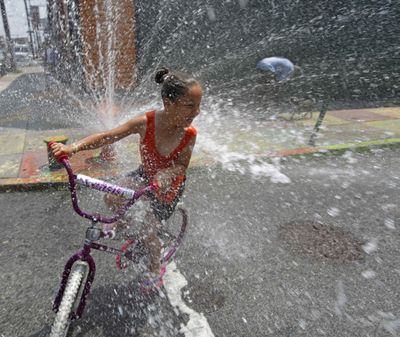Summer’s got sizzle in wilting Northeast

NEW YORK – The East Coast roasted under an unrelenting sun Tuesday as record-setting temperatures soared past 100 from Virginia to Massachusetts, utility companies cranked up power to the limit to cool the sweating masses and railroad tracks were so hot commuter trains had to slow down.
“It’s brutal,” said construction worker Pat McHugh, 49, his face shiny with sweat, as he took a break in New York City. “Worst heat on the job in 10 years.”
The temperature broke records for the day in New York, where it hit 103, and in Philadelphia, where it reached 102.
“It’s safe to say this is one of the hottest days in about a decade for many locations in the Northeast and even inland,” said Sean Potter of the National Weather Service. “You’d go back to 2001 or maybe 1999 to find a similar heat wave.”
With people cranking up the air conditioning, energy officials said there was tremendous demand for electricity, but the grid didn’t buckle.
Few power problems were reported and the operators of the regional electrical systems that serve the mid-Atlantic, New England and New York said they had ample capacity. Usage appeared to be falling just short of records set throughout the Northeast during a major heat wave in 2006.
Meteorologists in some places began calling the hot stretch a heat wave, a phenomenon defined in the Northeast as three consecutive days of temperatures of 90 or above. New Jersey’s largest city, Newark, handily beat that threshold, hitting 100 for the third day in a row. Temperatures in the mid-Atlantic region are expected to be in the high 90s to 100 again today.
It was so hot that even machines had to slow down. Transportation officials cut the speed of commuter trains in suburban Washington when the tracks got too hot. Extreme heat can cause welded rails to bend under pressure.
The hot air is “sitting over the top of us, and it’s not really going to budge much for the next day or two,” said Brian Korty, a meteorologist with the National Weather Service in Camp Springs, Md. After that, he said, a system coming in off the Atlantic Ocean would bring in cooler weather.